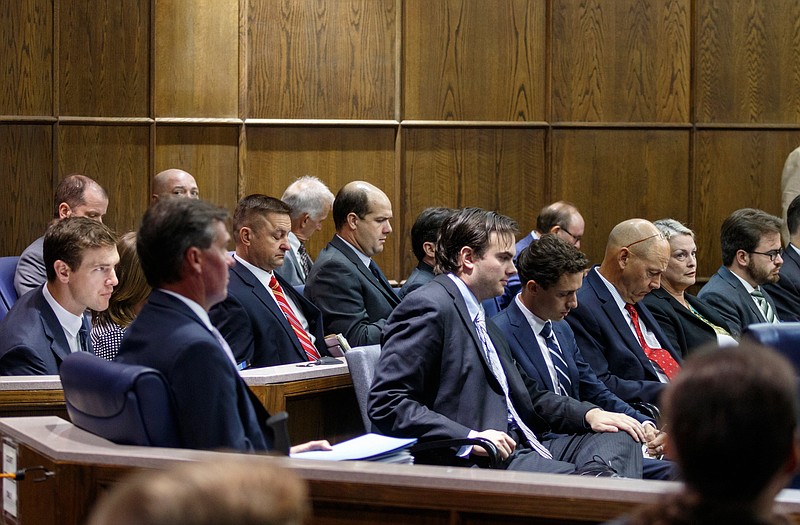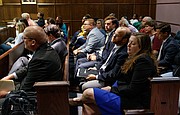A Hamilton County Criminal Court judge has ordered racketeering charges against 47 of the 55 alleged members of the Athens Park Bloods gang to be dismissed, citing the state's failure to show a pattern of racketeering activity as defined by state law. The 47, though, still face racketeering conspiracy charges along with the remaining defendants.
Fifty-four gang members were indicted in March 2018, marking the first time a street gang in Hamilton County had been prosecuted as a criminal enterprise under the state's Racketeer Influenced and Corrupt Organizations Act.
That case was dismissed and replaced with a more detailed criminal indictment that better described what each person was accused of and how it allegedly related to gang activity. The new indictment added a 55th defendant and 12 more charges, bringing the total to 25.
Each of the 55 defendants is facing racketeering conspiracy charges, and 8 still face racketeering charges. Some defendants also face other charges, including first-degree murder.
One of the accused, Antwon Lee, was shot and killed in April. Until not long before his death, he was being held in solitary confinement at Silverdale Detention Center. He previously told Judge Tom Greenholtz that jail administrators weren't providing him with his mental health disorder medication.
A lot is at stake in this gang racketeering case. Eight men are charged in six previously unsolved homicides, including the May 2016 slaying of state witness Bianca Horton. Andre Grier, Courtney High and Charles Shelton potentially face the death penalty if convicted of that crime.
Greenholtz's 27-page opinion issued Friday states the indictment failed to meet the law's requirement of showing a "pattern of racketeering activity." Prosecutors had to show that at least two prior crimes, or "predicate acts," took place within two years of each other and that they were committed on the gang's behalf.
Greenholtz noted that, "despite the plain language of the RICO Act," the indictment failed to state when some defendants actually committed the alleged crimes and only stated when there was a conviction. And, he wrote after looking into the cases that were listed as proof of prior crimes, the crimes were committed more than two years apart. In other cases, prosecutors listed only one prior crime.
"It is clear, therefore, that the Grand Jury has not properly alleged a pattern of racketeering activity," he wrote.
Also, Greenholtz noted that a predicate act cannot be based on a crime for which the defendant has already been convicted.
Tennessee law states that a person may be convicted either on a violation of the Racketeer Influenced and Corrupt Organizations Act or of the prior crimes predicate acts, "but not both."
"If [the defendants are] ultimately convicted of violating the RICO Act in the current prosecution, [they] will be in the very scenario that the plain language of [state law] expressly prohibits: [they] will have been convicted both of a RICO violation and of the predicate acts alleged to have constituted the pattern of racketeering activity," Greenholtz wrote.
Because the analysis invalidated count one (the racketeering charge) of the indictment, Greenholtz dismissed the racketeering charge against 47 of the defendants, including some of those facing first-degree murder charges. Though he noted that, had the case been tried at the federal level, it would likely continue, as federal law allows for a 10-year period between prior crimes instead of just two.
"However, because our Tennessee RICO Act appears to be a more purposefully limited prohibition on racketeering activity, the Court has no choice but to grant [the motion to dismiss] as to the first [count]," he wrote.
The racketeering allegations against the remaining eight met the law's requirements.
It's not clear where the racketeering conspiracy charge stands, as the court has "outstanding issues" related to it.
Greenholtz asked prosecutors and defense attorneys to offer their thoughts on consolidating some cases and splitting the murder charges into their own separate cases apart from the main racketeering case. That will be addressed in court on Sept. 30.
Other questions remain about whether some defendants' charges are too old to be included in the racketeering indictment. In at least one defendant's case, all of his prior crimes took place before May 2012, which is the date after which gang offenses were added to what could consist of a "pattern of racketeering activity."
Greenholtz invited discussion on the matter but noted the defendant would have to file a motion to dismiss based on that ground.
Contact Rosana Hughes at rhughes@timesfreepress.com or 423-757-6327 with tips or story ideas. Follow her on Twitter @HughesRosana.

